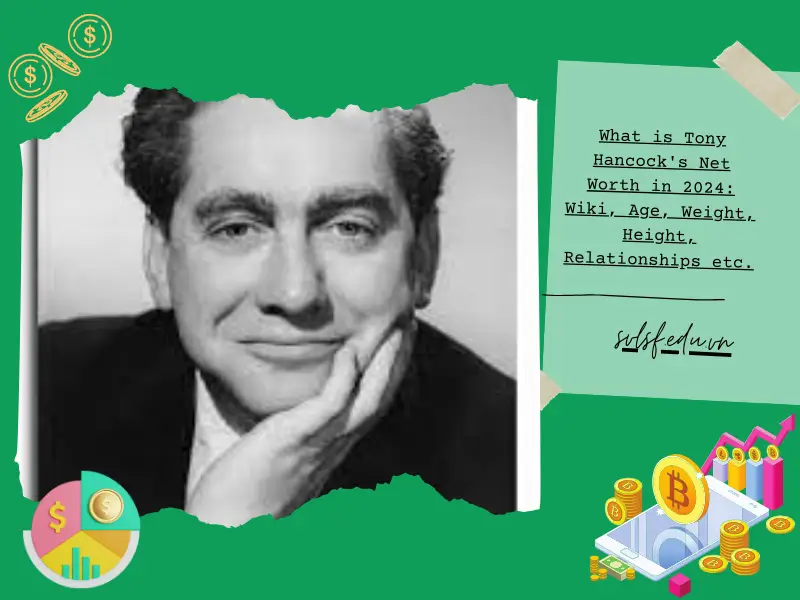Tony Hancock, a pioneer in British comedy, has left an indelible mark on the entertainment industry.
In this article, Rachel Parris explores Tony Hancock net worthprovides a detailed analysis of his financial legacy and how it reflects his immense contribution to the world of comedy.
Quick information
| Real name | Anthony John Hancock |
| Popular name | Tony Hancock |
| Sex | male |
| Date of birth | May 12, 1924 |
| Age at death | 44 (Died June 25, 1968) |
| Parents | John and Lillian Hancock |
| Siblings | Roger Hancock |
| Place of birth | Birmingham, England |
| Nationality | brother |
| Nation | English |
| Education | Durlston Court, Bradfield College |
| Marital status | Divorced |
| Sexual orientation | Straight |
| Wife/Wife/husband | Cicely Romanis, Freddie Ross |
| Children | do not apply |
| Dating | do not apply |
| Net value | do not apply |
| Origin of wealth | Comedy, acting |
| Category | Comedy |
| Height | 5 ft 7 in (1.7 m) |
What is Tony Hancock’s net worth in 2024?

Although specific figures are difficult to come by regarding Tony Hancock’s net worth at the time of his death in 1968, it is clear that his career as a pioneering comedian and actor was met with considerable financial success. financial side.
Compared to contemporaries such as Joan Le Mesurier and Sid JamesHancock’s income was largely derived from his groundbreaking work on radio and television, especially Hancock’s half hour.
Writer Ray Galton And Alan SimpsonThose who contribute to Hancock’s success also share in the financial rewards of their collective creativity.
Although direct comparisons are challenging due to the lack of specific financial data, Hancock’s influence and legacy in British comedy suggest a significant, albeit speculative, net worth.
Tony Hancock Full Overview and Wiki

The rise of a comedy legend
Tony Hancock, born Anthony John Hancock, was an English comedian and actor whose career spanned from the early 1940s until his sudden death in 1968.
Hancock’s journey to stardom began in the post-war period, a time when Britain was in desperate need of laughter and lightness.
His early work in radio, especially on Hancock’s half hoursetting the stage for what would become a legendary career.
Breakthrough to new lands
Hancock’s half hourFirst broadcast on radio in 1954 and later transferred to television, revolutionized British comedy.
It abandoned the variety show format, focusing instead on situation comedy rooted in the characters and their everyday lives. Hancock’s depiction of a version of himself, struggling against worldliness and yearning for greatness, resonated with audiences.
This innovative approach not only increased Hancock’s popularity but also contributed significantly to his net worth over time.
A star among the stars
Working alongside Sid James, and under the brilliant writing of Ray Galton and Alan Simpson, Hancock became a household name.
The ability to grasp the essence of all men Simultaneously aspiring and often failing at greatness is a source of endless humor and relatability.
This period marked the peak of Hancock’s career, with his shows attracting large audiences and his influence on comedy undeniable.
The challenges of success
Despite her professional success, Hancock’s personal life was full of challenges. His decision to part ways with Sid James and then Galton and Simpson marked the beginning of the decline in his career.
Hancock’s efforts to reinvent himself and his art, although ambitious, led to mixed results and had a significant impact on his personal and financial well-being.
Legacy and influence
Tony Hancock’s contribution to comedy and entertainment cannot be overestimated. His work laid the groundwork for future generations of comedians and sitcoms, influencing the structure and tone of comedic storytelling for years to come.
Personal life
Tony Hancock’s personal life, marked by two marriages and a series of complicated relationships, was also tumultuous while his career was on the rise.
His struggles with alcoholism and the pressures of fame took their toll, culminating in his tragic suicide in 1968. Despite these challenges, Hancock’s impact on those who knew him and his audience is very insightful.
Tony Hancock 2024 list news
https://www.youtube.com/watch?v=xDBCuumy78
When he died in 1968, there was no news for Tony Hancock!
Social Media
do not apply
Frequently asked questions about Tony Hancock

Who is Tony Hancock?
Tony Hancock is an English comedian and actor best known for his radio and television work, especially the BBC comedy Hancock’s Half Hour (1954–1961). He worked closely with comedian Sid James until 1960.
What is Hancock’s half hour?
Hancock’s Half Hour was an important BBC radio and later television comedy series in which Hancock played a variety of roles, often highlighting his comedic abilities.
The show, well written by Ray Galton and Alan Simpson, set the standard for sitcoms that focused on the daily lives and petty obsessions of the characters.
What is his background?
Born in Hall Green, Birmingham, Hancock grew up in Bournemouth, Hampshire. He was educated in Swanage, Dorset and Reading, Berkshire.
Is he having any personal difficulties?
Yes, Hancock was known to be a depressive alcoholic, and his struggles with these issues were important factors in his life and career.
How did Tony Hancock die?
Hancock died by suicide in 1968, in Sydney, New South Wales, Australia from an overdose of amphetamine and vodka.
What was the impact of his work on later comedians?
His humorous style and the format of Hancock’s Half Hour have been cited as an influence on later comic characters and shows, including Alan Partridge and David Brent, demonstrating his lasting impact for British comedy.
What are some of his most memorable works?
Among his best remembered works are The Blood Donor and The Radio Ham, which highlight his comedic talent and the broad appeal of his humor.
Does he have any problems with his collaborators?
He gradually distanced himself from key figures who contributed to his success, such as Sid James and his screenwriters, Galton and Simpson. He wanted to perfect his craft beyond catchphrases and sought out more realistic comedy, which led to significant career changes.
What was the nature of his relationship with Sid James?
Hancock ended his professional relationship with Sid James, feeling that their work together was turning them into a double act, a move that shocked many, including James himself.
How has his career developed over time?
Hancock’s career saw him move from radio to television, in an attempt to introduce more realism into his comedy. His move toward independence from his collaborators marked an important, albeit tumultuous, period in his career, affecting the direction of his work and personal life.
Conclusion
A review of Tony Hancock’s net worth not only sheds light on the economic aspects of his career but also confirms his place among the UK’s famous comedy icons. His legacy, enriched by his comedic genius, continues to inspire and entertain, proving the timeless appeal of his work.
Categories: omedian
Source: svlsf.edu.vn

